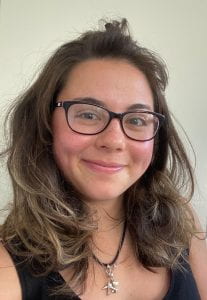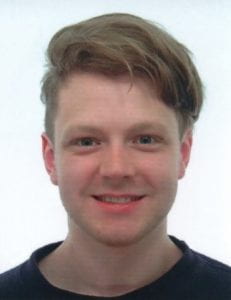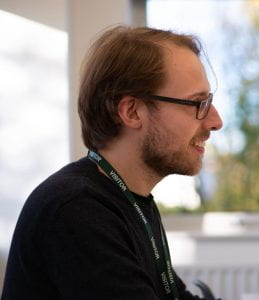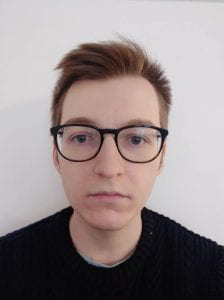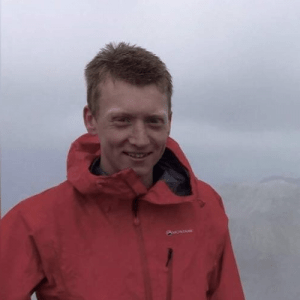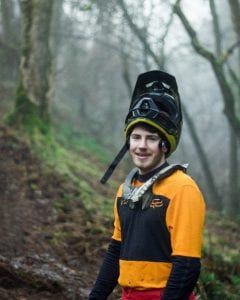Aligned Students
Jenny Jobling
University: Imperial College London
Supervisor: Dr Bo Lan & Professor Mike Lowe
Sponsor: Rolls Royce
EngD Project: Phase Characterisation of Nickel-Based Superalloys Using Ultrasound
Ultrasonic methods are widely used in NDE for defect detection, but there has been increasing research in using ultrasound for bulk material property characterisation, particularly for aerospace engine materials. Techniques have been successfully applied for use with titanium alloys, and my research will focus on how these can be further developed for phase characterisation of nickel superalloys, which are widely used for high temperature regions of aerospace engines.
Richard Eager
University: Imperial College London
Supervisor: Dr Peter Huthwaite Industrial
Sponsor: Guided Ultrasonics Limited (GUL)
PhD Project: Model-Based Inversion of Guided Waves in Pipes
My project will explore full wave inversion using finite element modelling, focusing on guided waves. This will be a model building tool that will allow for the quantitative detection and imaging of defects when given a measured signal, while maintaining the long range sensing benefits of guided waves.
Alasdair Regan
University: Manchester
Supervisor: Prof Anthony Peyton
Sponsor: Tenaris
PhD Project: Electromagnetic Non-Destructive Testing for Inspecting the Microstructure of High Performance Ferritic Steels
New techniques to measure the microstructure of a material in a non-contact non-destructive fashion can lead to a dramatic improvement in the understanding of the material and its behaviour during processing and in-service, and an ability to control or predict the material properties. This project will consider advanced magnetic techniques for inspecting the microstructure of high value ferritic steels during manufacture and in service, focussing on applications of strategic importance to industry. The key aims are to establish robust relationships between microstructure and the magnetic properties and to devise sensors which exploit these relationships for use in the field.
Rory Mansell
University: Manchester
Supervisors: Prof Timothy Coates and Dr Martin Fergie
PhD Project: Machine Learning to Locate Defects in Ultrasonic Inspection Images
It is important that manufactured components are inspected to identify defects which may cause early failure, particularly in safety critical systems. Non-destructive techniques, such as ultra-sound, are used regularly to be able to see below the surface to identify hidden defects. This project aims to develop automatic techniques to help identify the defects. The student will combine image analysis and machine learning methods to build a system that can reliably distinguish between normal parts and regions with abnormalities. This project will investigate the application of novel analysis techniques to ultrasonic NDE inspection, aiming to support the analysis of phased-array or Time-of-Flight-Diffraction images.
The project is actively supported by BAE Systems Maritime who deploy these techniques in a large scale manufacturing environment. The benefits of a robust automated analysis process would be very significant and could potentially reduce the inspection cost and duration for large scale welded structures across many industrial sectors.
Euan Duernberger
University: Strathclyde
Supervisor: Charles MacLeod
PhD Project: Advanced Non-Destructive Testing of Blade Manufacturing Defects
Wind turbine blades are one of the most costly and complicated components of the wind turbine. Now approaching 100m in length, they are manufactured using carbon and glass fibre reinforced polymer composites. Non-Destructive Testing (NDT) methods are utilized to identify any potential defects so to reduce potential asset outages, operational maintenance costs and extend lifetimes.
Ultrasonic testing techniques are a promising NDT method for blade inspection, due to volumetric inspection capability, but current uses are limited due to complexities with the data/image analysis typically performed by trained experts. The aerospace industry has pioneered investigation into contactless scanning methods for complex geometry inspection, coupled with detection algorithms and machine-learning techniques. Investigation and optimisation of these methods to wind turbine blades will enable more efficient and cost-effective inspections resulting in overall benefits for clean energy production.
A review of current ultrasonic NDT techniques for composite materials will be conducted and the most applicable for the wind industry identified. These will be tested on small blade samples, provided by industrial partner Siemens Gamesa Renewable Energy. Following on from this, processes are to be upscaled with the aim of developing mature and fully automated inspection, and image analysis, techniques used in large-scale blade manufacturing.
Ross McMillan
University: Strathclyde
Supervisor: Dr Gordon Dobie
PhD Project: Utilise a Multi-Agent System and EMAT’s to Carry out Thickness Measurements and Defect Detection within Ferromagnetic Structures.
Alan Keenan
University: Strathclyde
Supervisor: Dr Theodosia Stratoudaki
PhD Project: Laser-Generated and Detected Ultrasound for NDT
Peter Lukacs
University: Strathclyde
Supervisor: Dr Theodosia Stratoudaki
PhD Project: Volumetric Imaging for Laser Induced Phased Arrays (LIPA)
Alastair Poole
University: Strathclyde
upervisor: Professor Gareth Pierce Sponsor: TWI
PhD Project: Advanced End Effector System for Robotic Inspection Systems

